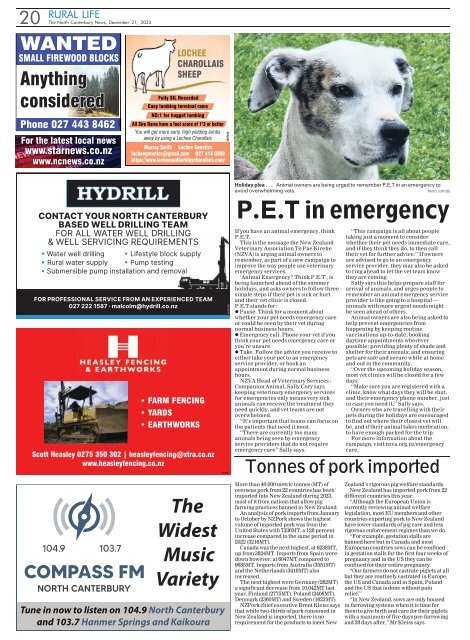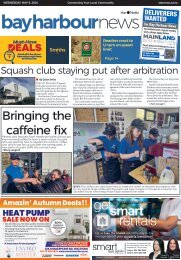Nor'West News: December 21, 2023
You also want an ePaper? Increase the reach of your titles
YUMPU automatically turns print PDFs into web optimized ePapers that Google loves.
20 The<br />
RURAL LIFE<br />
North Canterbury <strong>News</strong>, <strong>December</strong> <strong>21</strong>, <strong>2023</strong><br />
WANTED<br />
SMALL FIREWOOD BLOCKS<br />
Anything<br />
considered<br />
Phone 027 443 8462<br />
For the latest local news<br />
www.starnews.co.nz<br />
www.ncnews.co.nz<br />
2639692<br />
LOCHEE<br />
CHAROLLAIS<br />
SHEEP<br />
Fully SIL Recorded<br />
Easy lambing terminal rams<br />
NO:1 for hogget lambing<br />
All Sire Rams have afoot score of 1’3 or better<br />
Youwill getmoreearly,highyieldinglambs<br />
away by using aLochee Charollais<br />
MurraySmith Lochee Genetics<br />
locheegenetics@gmail.com 027 414 0308<br />
https://www.locheeandberkleycharollais.com/<br />
2637815<br />
CONTACTYOURNORTH CANTERBURY<br />
BASEDWELLDRILLING TEAM<br />
FOR ALL WATER WELL DRILLING<br />
& WELL SERVICING REQUIREMENTS<br />
· Water well drilling · Lifestyle block supply<br />
· Rural water supply · Pump testing<br />
· Submersible pump installation and removal<br />
FORPROFESSIONALSERVICEFROMANEXPERIENCED TEAM<br />
027222 1587 ·malcolm@hydrill.co.nz<br />
• FARM FENCING<br />
• YARDS<br />
• EARTHWORKS<br />
Scott Heasley 0275 350 302 |heasleyfencing@xtra.co.nz<br />
www.heasleyfencing.co.nz<br />
The<br />
Widest<br />
Music<br />
Variety<br />
Tune in nowtolistenon104.9 NorthCanterbury<br />
and103.7 Hanmer Springsand Kaikoura<br />
2632578<br />
2539907<br />
Holiday plea ... Animal owners are being urged to remember P.E.T in an emergency to<br />
avoid overwhelming vets.<br />
PHOTO: SUPPLIED<br />
P.E.T in emergency<br />
If you have an animal emergency, think<br />
P.E.T.<br />
This is the message the New Zealand<br />
Veterinary Association Te Pae Kīrehe<br />
(NZVA) is urging animal owners to<br />
remember, as part of anew campaign to<br />
improve the way people useveterinary<br />
emergency services.<br />
‘AnimalEmergency? Think P.E.T’, is<br />
being launched ahead of the summer<br />
holidays,and asks owners to follow three<br />
simple steps if their pet is sick or hurt<br />
and their vet clinic is closed.<br />
P.E.T stands for:<br />
Pause. Think for amoment about<br />
whether your pet needs emergency care<br />
or could be seen by their vet during<br />
normal business hours.<br />
Emergency call. Phone your vet if you<br />
think your pet needs emergency care or<br />
you’re unsure.<br />
Take. Follow the advice you receive to<br />
either take your pet to an emergency<br />
service provider, or book an<br />
appointment duringnormal business<br />
hours.<br />
NZVAHead of Veterinary Services <br />
Companion Animal, Sally Cory says<br />
keeping veterinary emergency services<br />
for emergenciesonly means very sick<br />
animals can receive the treatment they<br />
need quickly, and vet teams are not<br />
overwhelmed.<br />
‘‘It’simportant that teams can focus on<br />
the patients that need it most.<br />
‘‘There are currently too many<br />
animals being seen by emergency<br />
service providers that do not require<br />
emergency care’’ Sally says.<br />
‘‘This campaign is all about people<br />
taking just amoment to consider<br />
whether their pet needs immediate care,<br />
and if they think they do, to then call<br />
their vet for further advice.’’ If owners<br />
are advised to go to an emergency<br />
service provider, they may also be asked<br />
to ring ahead to let the vet team know<br />
they are coming.<br />
Sally says this helps prepare staff for<br />
arrival of animals, and urges people to<br />
remember an animal emergency service<br />
provider is like going to ahospital —<br />
animals with more urgent needs might<br />
be seen ahead of others.<br />
Animal owners are also being asked to<br />
help prevent emergencies from<br />
happening by keeping routine<br />
vaccinations uptodate; booking<br />
daytime appointments wherever<br />
possible; providing plenty of shade and<br />
shelter for their animals; and ensuring<br />
pets are safe and secure while at home<br />
and out in the community.<br />
‘‘Over the upcoming holiday season,<br />
most vet clinics will be closed for afew<br />
days.<br />
‘‘Make sure you are registered with a<br />
clinic, know what days they will be shut,<br />
and their emergency phone number, just<br />
in case you need it,’’ Sally says.<br />
Owners who are travelling with their<br />
pets during the holidays are encouraged<br />
to find out where their closest vet will<br />
be, and if their animal takes medication,<br />
to have enough packed for the trip.<br />
For more information about the<br />
campaign, visit nzva.org.nz/emergency<br />
care.<br />
Tonnes of porkimported<br />
More than 40,000 metric tonnes (MT) of<br />
overseas pork from 22 countries has been<br />
imported into New Zealand during <strong>2023</strong>,<br />
most of it from nations thatallow pig<br />
farming practices banned in New Zealand.<br />
An analysis of pork imports from January<br />
to October by NZPork shows the highest<br />
volume of imported pork was from the<br />
United States with 7336MT, a128 percent<br />
increase compared to the same period in<br />
2022 (3<strong>21</strong>6MT).<br />
Canada was the next highest, at 6238MT,<br />
up from 3824MT. Imports from Spain were<br />
down however, at 6047MT compared to<br />
9685MT. Imports from Australia (3551MT)<br />
and the Netherlands (3418MT) also<br />
increased.<br />
The next highest were Germany (262MT)<br />
asignificant decrease from 10,042MT last<br />
year, Finland (2775MT), Poland (2406MT),<br />
Denmark (2360MT) and Sweden (1623MT).<br />
NZPork chief executive Brent Kleiss says<br />
that while twothirds of pork consumed in<br />
New Zealand is imported, there is no<br />
requirement for the products to meet New<br />
Zealand’s rigorous pig welfare standards.<br />
New Zealand has imported pork from 22<br />
different countries this year.<br />
‘‘Although the European Union is<br />
currently reviewing animal welfare<br />
legislation, most EU members and other<br />
countries exporting pork to New Zealand<br />
have lower standards of pig care and less<br />
rigorous enforcement regimes than we do.<br />
‘‘For example, gestation stalls are<br />
banned here but in Canada and most<br />
European countries sows can be confined<br />
in gestation stalls for the first four weeks of<br />
pregnancy and in the USthey can be<br />
confined for their entire pregnancy.<br />
‘‘Our farmers do not castrate piglets at all<br />
but they are routinely castrated in Europe,<br />
the US and Canada and in Spain, Poland<br />
and the US that is done without pain<br />
relief.’’<br />
‘‘In New Zealand, sows are only housed<br />
in farrowing systems when it is time for<br />
them to give birth and care for their piglets<br />
with amaximum of five days prefarrowing<br />
and 28 days after,’’ Mr Kleiss says.


















